Africa

If I’ve learned anything since my time in Rome, it’s that people — not just Catholics — are hungering to connect peace with justice. This is why those of us who traveled to Rome just before the election, accompanied by Stockton, Calif., Bishop Stephen Blaire, and Houma-Thibodaux, La., Bishop Shelton Fabre, are preparing for a regional WMPM meeting in Modesto, Calif., in February.
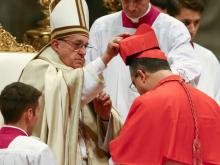
At a solemn ceremony in St. Peter’s Basilica, to elevate 17 new cardinals, Pope Francis, on Nov. 19, delivered a ringing plea to the world, and his own Catholic Church, to reject “the virus of polarization and animosity," and the growing temptation to “demonize” those who are different.
The pontiff’s address came across as a powerful, gospel-based indictment of the populist and nationalist anger roiling countries around the world, displayed most recently by the stunning election of Donald Trump as president of the U.S.
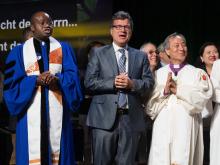
The Rev. Jerry Kulah has nothing but gratitude for the United Methodist Church.
In 1833, American Methodists sent their first missionary to his country, Liberia, which was founded for freed American slaves. Melville B. Cox died four months after he arrived in Africa, but the missionary’s legacy lives on in the United Methodist Church’s fastest-growing region, and in his words to his own church back in North Carolina: “Let a thousand fall before Africa be given up.”
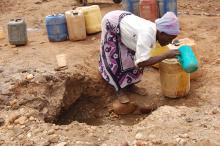
Churches in eastern and southern Africa are appealing for humanitarian aid in the region, as 36 million people grapple with the worst drought in decades. Linked to extreme El Nino weather conditions, the drought has hit countries such as Somalia, Ethiopia, Kenya, South Sudan, Malawi, and Zimbabwe, among others. The conditions have reversed normal weather patterns, upsetting people’s livelihoods.

Led by charismatic preachers and self-proclaimed prophets, African churches are swelling with promises of miracle healings, signs, and wonders. But in recent months, governments across the continent are trying to rein in these churches.
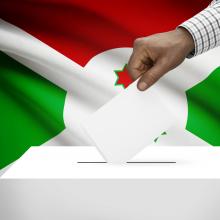
“There is nowhere a human being should be allowed to enslave others.”
This is a statement made by Burundian Catholic Archbishop Simon Ntamwana, referring to the Burundian president who was seeking an extra term in power. The archbishop was implicitly calling the president's actions unjust and unacceptable.
Indeed, the term limit crisis in Africa needs to be considered in the same light as the liberation, decolonization, and democratization movements against slavery and apartheid. Similarly to those struggles in history, today's term limit crisis in Africa is characterized by people struggling against oppression and political injustice.
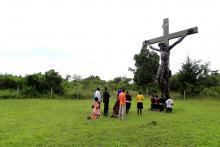
Francis marked the start of the jubilee on Dec. 8, when he opened the Holy Door at St. Peter’s Basilica in Rome. The yearlong celebration calls on Catholics to reflect on the theme of mercy and forgiveness and showcase a more inviting faith. That theme resonates in Africa, home to about 200 million Catholics. A sizable part of this population is tormented by war, violence from Muslim extremists, HIV/AIDS, and poverty.

Ultimately, we learn to overlook the light already present in these places. We come to think that our responsibility is to bring light when instead we should bear witness to a flame that already exists. In reality, where God is, there is light. If this whole created earth belongs to the Lord, there is no place his light doesn’t send forth a warm glow.
I used to volunteer with an organization called PEER Servants. PEER is an acronym for Partnering for Economic Empowerment and Renewal. PEER Servants partners with indigenous Christian microfinance institutions that want to help transform their communities and empower others to do the same. During my time as a volunteer, I learned about a woman in South Africa who used the profits from her business to begin a nursery school for her community. I read about a man in Uganda who wanted to expand his business so he could provide more jobs for his neighbors. These stories spread hope to my North Carolina home, a hope as warm as a rising sun.
In the first chapter of the biblical book of John, Nathanael says to Phillip, “Can anything good come out of Nazareth?” to which Phillip answers, “Come and see.”
Based on the typical narrative the West gives the African countries, the question might become, “Can anything good come out of the African continent?” And I would answer, “Come and see.”

Taylor Swift’s controversial new music video, “Wildest Dreams,” is intended to evoke awe of the “wildest” of African landscapes: pure natural beauty, “undiscovered” and “untarnished” — and entirely without Africans.
Perhaps because this video launched soon after Ms. Swift’s recent race- and privilege-related feud with Nicki Minaj, or because at the time of writing, the video has reached nearly 25 million views since its release on Aug. 30, response to the video has been intense. Reading articles on both sides was a conflicting experience, as a young white woman raised on fashion magazines, classic cinema, and the idealization of “old Hollywood.” Can we love and appreciate those films without endorsing that oppression? Is it possible to create an homage to them without endorsing them entirely? In short — how can we free ourselves from the cognitive dissonance of outwardly condemning racism, misogyny, and colonialism while still internally glorifying images and ideals that are built upon them?
The answer to this question may lie in other, more nuanced, portrayals of midcentury American culture.
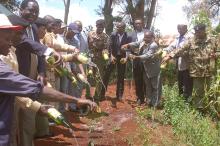
Clerics in Kenya are backing a presidential decree banning homemade brews, largely blamed for a recent spate of deaths in the East African nation.
The homemade alcoholic drinks, popularly dubbed chang’aa (“kill me quick”) or Kumi Kumi (ten-ten shillings), are popular with the poor, who cannot afford commercially brewed bottled beer, which is heavily taxed.
Until recently, most Kenyan homemade brews were safe and were consumed at traditional parties, but unscrupulous brewers in the last few years have been introducing industrial chemicals such as methanol to make the drinks stronger and to quicken the brewing process, turning the drinks into poisons.
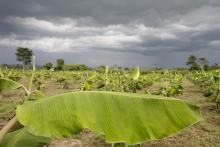
THE DEMOCRATIC REPUBLIC of Congo is one of the world’s poorest countries. In 2014, Congo ranked 186 out of 187 on the United Nations’ human development index—vying with Niger for the bottom of the list.
Yet Congo is extremely rich in soil, water, forests, and minerals. Diamonds, copper, gold, oil, uranium, and coltan are all mined, purchased, and traded from the DRC.
Coltan is the ore used in electronic devices. The so call “war of coltan” in the mineral-rich eastern Congo has left millions dead and more than a million women raped. Transnational corporations are able to exert extreme pressure on Congo’s weak government and economy. As a result, the country’s natural resources have become an important factor in increasing poverty and violence rather than wealth and development.
The Catholic bishops in Congo (about half of the country’s population is Catholic) repeatedly have denounced three specific kinds of evil: a climate favoring genocide, outbreaks of religious fundamentalism, and a push toward Balkanization.
Sébastien Muyengo, author of In the Land of Gold and Blood, is the Catholic bishop of Uvira in eastern Congo. As a result of the mineral wars, he writes, the country’s poverty has become a mental, human, and structural poverty, rather than predominantly material. Yet Congo has resources the rest of the world wants.

The rise of the so-called Islamic State dominated headlines in 2014, and trained the eyes of the world back on the Middle East.
Perhaps it should have looked at Africa as well.
In 2014, Africans suffered dozens of deadly terror attacks by groups either allied with Islamic State leader Abu Bakr Al-Baghdadi or using similarly bloody tactics.
Consider:
- In Nigeria: Boko Haram Islamists swept through the states of Yobe, Borno and Adamawa, killing and kidnapping civilians both Christian and Muslim. The group abducted more than 200 girls from a school in Chibok in April. The girls are still in captivity and the abduction still continues to draw global outrage.
- In Kenya: the Islamist militant group, Al-Shabab massacred 64 non-Muslims in Mandera County in November and December. The victims were separated from Muslims and shot on the head. In June, Al-Shabab killed 48 people — mainly Christians — in the Mpeketoni area in Lamu County.
- In Egypt: Ansar Bayt Al-Maqdis, the Sinai-based terror group, which recently pledged allegiance to the Islamic State, took responsibility for a deadly terror attack, which left 31 Egyptian soldiers dead.
- In the Central African Republic: Former members of the Islamist coalition Seleka were accused of massacring 34 people in villages in northern CAR. In May, Seleka was accused of killing 11 people, in an attack at the Fatima Catholic Church in Bangui.

As climate change devastates communities in Kenya, church leaders are helping to address the crisis locally while also calling on industrialized nations to own up to their responsibilities for spewing greenhouse gas emissions into the atmosphere.
“But we (in Africa) also have a role to play because we have not been very good stewards of the environment,” added Gichira, a poverty and development expert.“I think they (industrialized nations) are responsible for most of the emissions,” said Peter Solomon Gichira, the climate change program officer at the All Africa Conference of Churches. “They have responsibility to support climate change adaptation and mitigation as a moral obligation.”
People living in the Global South such as Kenya are suffering the worst consequences, climate experts say.
Droughts have become more severe and recurrent and are frequently followed by excessive rains or floods. Temperatures are much higher and weather patterns are now unpredictable.

“There is nothing quite like the African bush to sooth and rejuvenate.” That experience was conveyed to me by a South African church leader who has been helping plan the speaking tour I just arrived for here in this beloved country.
My wife, Joy, and I decided to use this wonderful speaking invitation to South Africa as an opportunity to take our annual August family vacation here. We arrived for a week of rest before the tour began and spent a few beautiful days on the lovely beaches of the Indian Ocean, still warm even for this end-of-winter period. But then the last two days, our Washington, D.C.-based family did something we have never done before — visited the game park and wetland reserve to see some of God’s most extraordinary creatures. Of course we’ve seen these animals in zoos before, but we now had the opportunity to see them roam freely in their natural habitat. For a bunch of city kids like us, it was truly amazing.
In Hluhluwe Game Reserve, beautiful zebras slowly grazed with a South African sunset behind them over the mountains. There are no more graceful creatures than giraffes, elegantly tasting the leaves on the tallest trees as they wander together at peace. Buffalos with great horns shared the terrain with antelopes that showed us their speed when they decided to run. And hyenas really do laugh off in the distance.
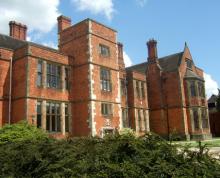
After 20 years of turmoil and angry debate, on Monday the General Synod of the Church of England said “yes” to women bishops.
The first could be named by the end of the year with the appointment of at least three additional women sometime in 2015, say senior church officials.
The General Synod is the three-tier governing body of the Church of England and it is made up of bishops, clergy, and laity.
At a meeting in York, the General Synod gave final approval to legislation introducing the changes by the required two-thirds majority.
Overall 351 members of the 433 Synod voted in favor of the measure.

Religious leaders from across Africa and England came together Wednesday to discuss the role clergy should play in preventing and responding to sexual violence.
The panel was part of the three-day Global Summit to End Sexual Violence in Conflict co-chaired by Angelina Jolie, the special envoy for the U.N. high commissioner for refugees. Jolie made an unannounced appearance before the event, causing attendance to surge and preventing several dozen participants from entering the crowded conference room.
In a pre-recorded video message, Archbishop of Canterbury Justin Welby started the session by describing some of the positive developments he observed firsthand on a recent trip to the Democratic Republic of Congo.
“Historically there has been a culture of impunity,” he said. “Faith leaders are challenging that culture fiercely and saying that rape and sexual violence in war is absolutely unacceptable and will result in consequences.”
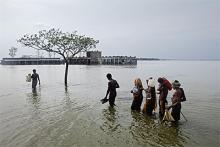
“Humanity is intimately tied to the world we live in, and every societal action and technological advance has an effect on the earth,” reads one of the plaques in the current Unintended Journeys exhibit at the Natural History Museum in Washington, D.C.
The temporary exhibit, which runs until Aug. 13, is a powerful photographic portrait of the catastrophic effects environmental disasters are having on millions of people around the world.
The exhibit focuses on five different countries that have recently experienced or continue to experience severe weather conditions that have caused displacement, migration, intense hardship, and death for inhabitants. The disasters covered are the Hurricane in the Gulf, the Earthquake in Haiti, the Tsunami in Japan, Flooding in Bangladesh, and Desertification in East Africa.
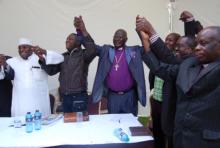
A call for greater acceptance of gays and lesbians has put African and Western churches on a collision course, as some African clerics liken mounting criticism from the U.S. and Europe to a new wave of colonization by the West.
“Homosexuality is equivalent to colonialism and slavery,” said one participant.
“We feel it’s like a weapon of mass destruction,” said another.
“It is not biblical and cannot bring blessing to Christians,” said a third.
Gitonga, a powerful East African Pentecostal church official, is among a group of Kenyan leaders who have launched “Zuia Sodom Kabisa,” Kiswahili for “Stop Sodom Completely.” The campaign seeks 1 million signatures to petition legislation to criminalize homosexual acts in Kenya.
LUKE'S SECOND VOLUME, the Acts of the Apostles, tells the story of what happened to Jesus’ followers after they received spiritual power to be his witnesses “in Jerusalem, in all Judea and Samaria, and to the ends of the earth” (Acts 1:8).
Beginning in Jerusalem, the movement proceeds north and west, eventually tracing Paul’s journey to Rome. But the plot takes one big detour along the way, heading south to the mysterious lands beyond Egypt, carried by a person more foreign and unusual than any other in Luke’s vast cast of characters. Only divine intervention orchestrates the encounter between the Jewish Hellenist Philip and the Ethiopian eunuch in Acts 8:26-40.
What is the main thrust of this missionary story? Is it geography—a foray into “the ends of the earth” long before Paul reaches Rome? Is it religious ethnicity—the first God-fearing Gentile believer converting, even before the Roman centurion Cornelius? Is it the man’s undeniable African origins—straight from the lands of Nubia and Cush? Is it his wealth and connections to royalty that will enable him to bring Jesus’ gospel to Africa?
Luke likely included this story for all these reasons, but the text itself points over and over to what must be the driving force of Luke’s inclusive theology in this account—the rider in the chariot is not referred to by Luke as a man. Luke calls him a “court official” and a eunuch (8:27), and later calls him a eunuch four more times, but never a “man.” He has been castrated before puberty and trained to take sensitive positions not entrusted to males. He is beardless with a higher voice. Torn from his birth family and enslaved at a young age, he has no family of his own. Loyal only to his queen, he is “in charge of her entire treasury.”
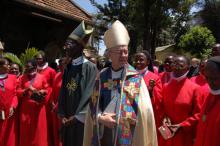
Ahead of his five-day visit to Africa, Archbishop of Canterbury Justin Welby issued a statement reminding Anglicans of the commitment the Church of England made eight years ago to the pastoral care and support of everyone, including gays and lesbians.
So far, the archbishop’s statement has not convinced African leaders.
On Wednesday, Anglican leaders in Africa rejected a proposal by the English College of Bishops for two-year “facilitated conversations” to address the differences over homosexuality within the worldwide Anglican Communion.